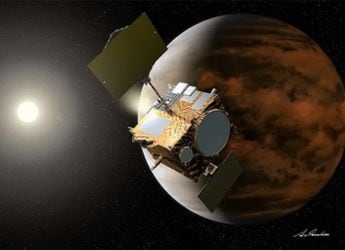- Home
- Science
- Science News
- Japan’s Akatsuki Spacecraft Declared Inoperable, Marking End of Dedicated Venus Missions
Japan’s Akatsuki Spacecraft Declared Inoperable, Marking End of Dedicated Venus Missions
JAXA’s Akatsuki spacecraft, launched in 2010, has officially ended its mission after more than a decade studying Venus’s atmosphere.

Photo Credit: JAXA
Artist's concept of Japan's Akatsuki spacecraft at Venus.
The planet Venus has lost the last orbiter dedicated to it. The Akatsuki spacecraft of Japan has been declared inoperable by the Japan Aerospace Exploration Agency (JAXA) after a decade-plus of successive atmospheric studies of our closest planetary neighbour. The declaration has been a reflection of how successful the mission has been in its capacity to go well beyond what it was designed to last, and how difficult it was to maintain old robotic spaceships in the hostile environment.
Mission Timeline and Achievements
As per JAXA, Akatsuki was the first Japanese attempt at a planetary orbiter to be launched in May 2010 on an H-IIA rocket. The first orbit insertion attempt in December 2010 was unsuccessful; however, engineers used a brilliant workaround of propelling it into orbit in December 2015 around Venus with the help of its attitude control thrusters. The spacecraft started performing nominal science in May 2016 and spent years continuing to investigate the turbulent atmosphere on Venus after having outlived the expected two-year spacecraft life. It lost contact in April 2024, and JAXA formally terminated the mission on 18 September 2025.
Scientific Legacy and What's Next
Critical discoveries about the dynamics of the Venusian atmosphere were made by Akatsuki, such as the fact that super-rotating layers of clouds, as well as extensive atmospheric waves, were observed. The findings are not only useful in understanding Venus but can also be used in researching exoplanet atmospheres and climates. Akatsuki has fallen quiet now, so a gap has been created in the monitoring of Venus; however, NASA and other agencies are planning several future missions like VERITAS and DAVINCI+ to fill the gap.
Get your daily dose of tech news, reviews, and insights, in under 80 characters on Gadgets 360 Turbo. Connect with fellow tech lovers on our Forum. Follow us on X, Facebook, WhatsApp, Threads and Google News for instant updates. Catch all the action on our YouTube channel.
Related Stories
- Samsung Galaxy Unpacked 2025
- ChatGPT
- Redmi Note 14 Pro+
- iPhone 16
- Apple Vision Pro
- Oneplus 12
- OnePlus Nord CE 3 Lite 5G
- iPhone 13
- Xiaomi 14 Pro
- Oppo Find N3
- Tecno Spark Go (2023)
- Realme V30
- Best Phones Under 25000
- Samsung Galaxy S24 Series
- Cryptocurrency
- iQoo 12
- Samsung Galaxy S24 Ultra
- Giottus
- Samsung Galaxy Z Flip 5
- Apple 'Scary Fast'
- Housefull 5
- GoPro Hero 12 Black Review
- Invincible Season 2
- JioGlass
- HD Ready TV
- Laptop Under 50000
- Smartwatch Under 10000
- Latest Mobile Phones
- Compare Phones
- Vivo Y19s 5G
- iQOO Neo 11
- Nothing Phone 3a Lite
- OnePlus Ace 6
- Lava Shark 2 G
- OnePlus 15
- Redmi K90
- Redmi K90 Pro Max
- MacBook Pro 14-inch (M5, 2025)
- Asus Vivobook S16 (S3607QA)
- iQOO Pad 5e
- OPPO Pad 5
- Garmin Venu X1
- Redmi Watch 6
- TCL 55 Inch QD-Mini LED Ultra HD (4K) Smart TV (55Q6C)
- TCL 55 Inch QD-Mini LED Ultra HD (4K) Smart TV (55C6K)
- Asus ROG Ally
- Nintendo Switch Lite
- Haier 1.6 Ton 5 Star Inverter Split AC (HSU19G-MZAID5BN-INV)
- Haier 1.6 Ton 5 Star Inverter Split AC (HSU19G-MZAIM5BN-INV)

















